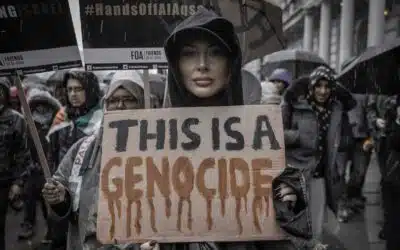Afghanistan President Hamid Karzai threatened to send forces into Pakistan in response to militant groups using Pakistan as a base to launch attacks into Afghanistan.
“If these people in Pakistan give themselves the right to come and fight in Afghanistan,” Karzai said, “as was continuing for the last 30 years, so Afghanistan has the right to cross the border and destroy terrorist nests, spying, extremism and killing, in order to defend itself, its schools, its peoples and its life.”
Pakistan’s Prime Minister Yousaf Raza Gilani said his government was incapable of preventing people from crossing its long border with Afghanistan and added, “Neither do we interfere in anyone else’s matters, nor will we allow anyone to interfere in our territorial limits and our affairs.”
Foreign Minister Shah Mehmood Qureshi responded by saying, “Since the two countries were faced with a common enemy it was all the more necessary that Afghanistan refrained from making irresponsible threatening statements.” He added, “I would also like to make it absolutely clear that Pakistan shall defend its territorial sovereignty.”
Pakistan lodged a protest with the Afghan Ambassador Mohammad Anwar Anwarzai. Islamabad had lodged a similar protest with the US Ambassador following last weeks air strikes.
Karzai’s statement comes after a US airstrike in Pakistan killed 11, causing a public outcry from the public and a statement of protest from the government.
President Pervez Musharraf has received US support since he ostensibly allied himself in the US “war on terrorism” following the terrorist attacks of September 11, 2001.
Musharraf miscalculated last year in attempts to consolidate his power, including dismissing the Supreme Court and suspending the constitution under martial law. In a parliamentary election, most lawmakers boycotted and walked out in protest of Musharraf for refusing to step down as head of the military before the election was held for the civilian post of President. The Supreme Court had been expected to decide that the election was invalid since he had yet not resigned from the military. Musharraf subsequently declared emergency rule and removed justices from their posts, appointing his own judges who would support his rule. At the same time, he cracked down on his public opposition with arbitrary arrests and efforts to silence the media.
His attempts to consolidate power were ill-received in Pakistan and met with fierce public outrage. Parties opposed to his rule largely gained control of the government earlier this year, and there have increasingly been calls to dismiss Musharraf. Opposition party leader and former Prime Minister, who was deposed in a coup by Musharraf, Nawaz Sharif, has called for Musharraf to be held accountable for crimes against the state.
The new government of Pakistan has rejected the US’s approach towards dealing with militant groups that have taken over parts of its territory in favor of entering into negotiations with groups and local tribal leaders. At the same time, it has expressed that it will be less tolerant of US attacks within its borders than Musharraf had been. The US has expressed its disapproval of the apparent break with Washington.
The takeover of large swaths of Pakistani territory by militant groups was largely a result of the US war to oust the Taliban in Afghanistan following 9/11.
Karzai’s statement was widely interpreted as being prompted by Washington. Pakistan Senator Rahat Hussain said “he was speaking the language of someone else”, referring to the US and, by extention, NATO.
Karzai has long been Washington’s man in Afghanistan, but recently has come under increased criticism and claims of being an ineffective leader. There have even been suggestions that he might be replaced, with Zalmay Khalilzad named as a possible successor. Khalilzad worked closely with Karzai as the President’s Special Envoy, and then Ambassador to Afghanistan. He later became Ambassador to Iraq and, following that, Ambassador to the UN.
When asked whether he backed Karzai’s statement to send troops into Pakistan, President Bush replied, “Our strategy is to deny safe haven to extremists who would do harm to innocent people. And that’s the strategy of Afghanistan; it needs to be the strategy of Pakistan.” He suggested that Afghanistan and Pakistan need to work together and that the US could help “develop a strategy that will prevent these extremists from, you know, from developing safe haven and having freedom of movement.”


